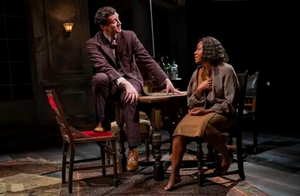Review Roundup: A BRIGHT ROOM CALLED DAY at the Public - What Did the Critics Think?

A BRIGHT ROOM CALLED DAY, written by Pulitzer Prize-winning playwright Tony Kushner and directed by Public Theater Artistic Director Oskar Eustis, is now playing at the Public.
The complete cast for A Bright Room Called Day features Linda Emond (Annabella Gotchling), Michael Esper (Vealtninc Husz), Grace Gummer (Paulinka Erdnuss), Jonathan Hadary (Xillah), Nikki M. James (Agnes Eggling), Crystal Lucas-Perry (Zillah), Nadine Malouf (Rosa Malek), Mark Margolis (Gottfried Swetts), Estelle Parsons (Die Älte), Danielle Skrastaad (Understudy), Michael Urie (Gregor Bazwald), Kerry Warren (Understudy), and Max Woertendyke (Emil Traum).
Agnes, an actress in Weimar Germany, and her cadre of passionate, progressive friends, are torn between protest, escape, and survival as the world they knew crumbles around them. Her story is interrupted by an American woman enraged by the cruelty of the Reagan administration, and a new character, grappling with the anxiety, distraction, hope, and hopelessness of an artist facing the once unthinkable rise of authoritarianism in modern America.
Let's see what the critics are saying...
Ben Brantley, New York Times: The only complete character here is Xillah. And while I guess it's a privilege to be allowed to watch a great playwright in dialogue with a lesser work from his past, it's a privilege that ultimately pales. Even Xillah and Zillah seem drained of energy as the long night draws to its end. And while (spoiler, sort of) the production concludes with a (sort of) call to action, no one who has sat through its nearly three hours is going to feel like leaping up and starting a revolution. By that time, bed seems far preferable to the barricades.
Frank Scheck, The Hollywood Reporter: It doesn't help that Eustis, who describes how he instantly fell in love with the play when he saw its original workshop incarnation, lacks the objectivity to have reined in some of the authorial indulgence. Yes, it's Kushner, which means that there is much blazing intelligence and imagination on display. Even at its most flawed, there's no doubting that A Bright Room Called Day is the work of a major playwright. Nonetheless, when, at the end of the evening, Xillah finally relents to Zillah's entreaties and announces that he's done yet another rewrite, you find yourself wishing that the playwright had the strength to finally let it go.
Helen Shaw, Vulture: But two very clever men, Eustis and Kushner, have made an artwork that talks a great deal about action while actually imparting inertia. If we know anything about how we overcome our resting state, it's that we need to change our company, to be among those who are already in movement. There's so much wonderful Kushnerian text in Bright Room that your ear and mind will be delighted. But that other part of you, the part that brandishes the sword, might slumber on.
Howard Miller, Talkin Broadway: On paper, all of this sounds like an old-fashioned melodramatic history play. Yet Mr. Kushner is such a strong writer that he is able to instill in his characters a fluidity of speech that is poetic without being flowery, smart without being condescending, and witty without being focused on landing an obvious punchline. Truly, we don't need the slides. We would have no trouble "getting it" without them. It is actually a real strength to have set the play during the pre-Holocaust years. We in the audience are perfectly able to provide our own sense of impending dread, thank you.
Tulis McCall, New York Theatre Guide: It is only in the final moments of the play that the past and the present merge. Agnes' spirit rises to the challenge and we finally see Kushner's intended destination. The scene is shattering. Would that we had arrived earlier.
Reader Reviews


